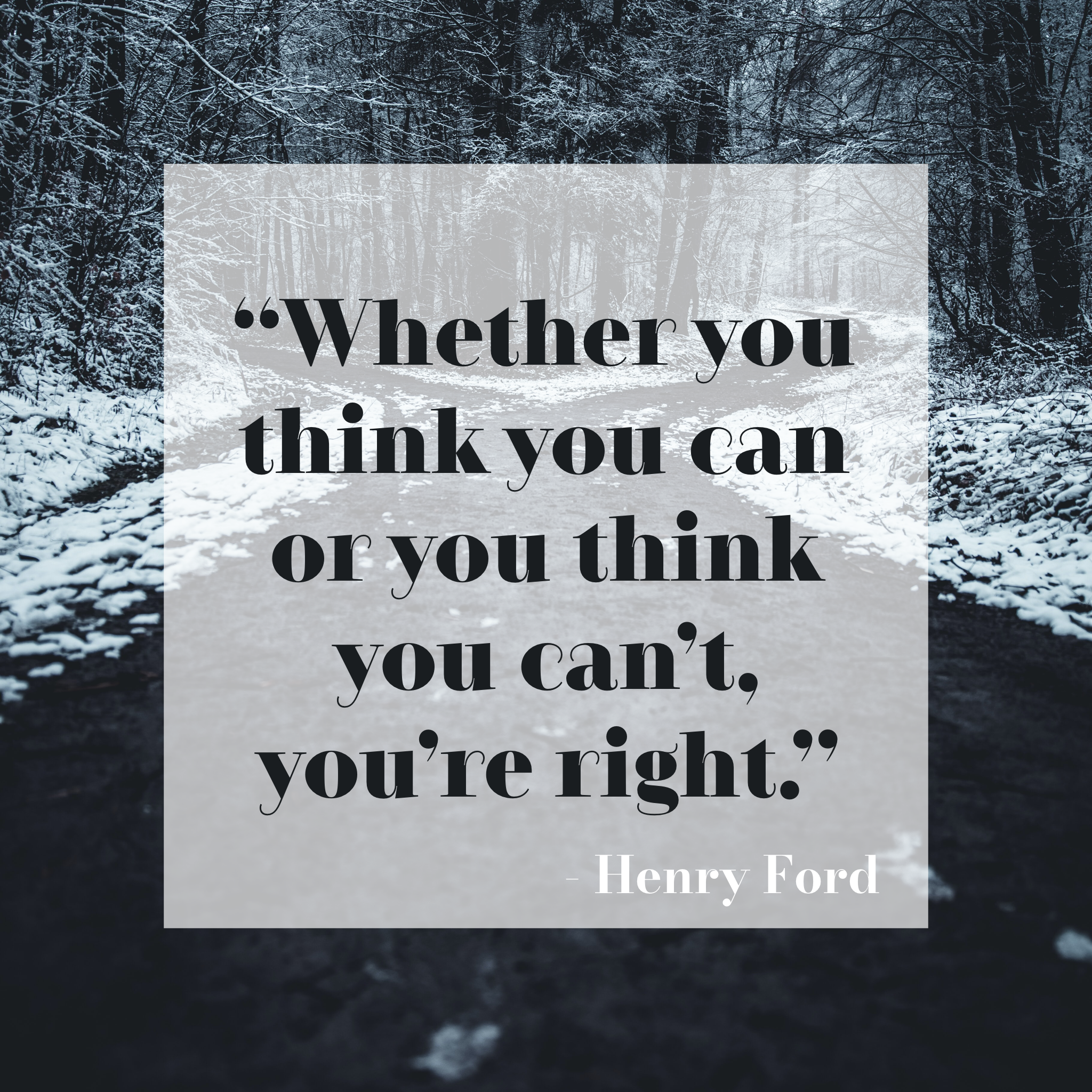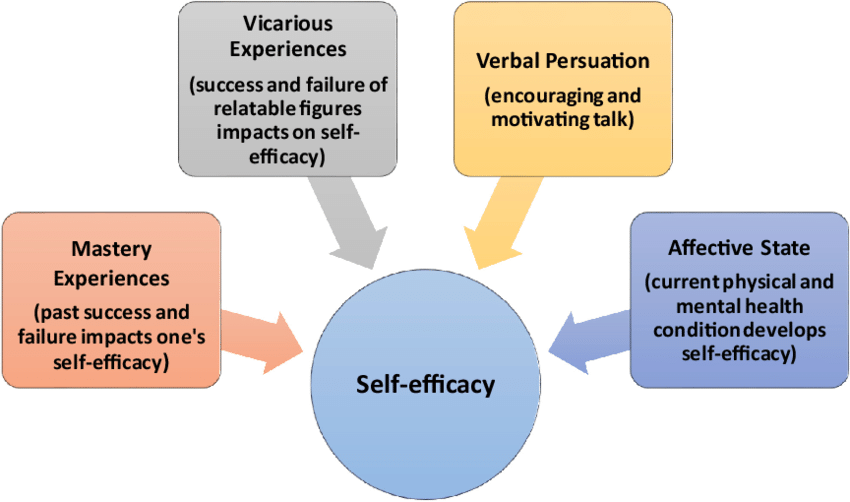You want more Self-Efficacy
As we move to a more virtual platform for learning, there is a stronger emphasis on motivational tools that help students and professional receive more success in their fields. The data reflects that people with high self-efficacy tend to have better emotional well-being, perform better in tasks, and are more likely to persist in the face of obstacles.
So what is this, and how can you get more of it?
Let me start by asking you a couple questions to get your efficacy gears turnings. Imagine you home from a day of fun activities, you turn on the faucet to wash your hands and when you turn it off, it starts leaking. Bummer I know but what do you do? Are you checking under the sink, tightening any knobs? Do you think you can repair this or do you call a plumber? Next scenario, you join a recreational sports team because you want to be more active and involved. The first practice you go to you realize that everyone else seems to be better at catching, hitting, passing… all the sports things. What do you think? Are you gonna throw in the towel or give it a couple more weeks? Would you practice a little more to get more skills? Last one, say you’ve been at your job for years and you believe you deserve a raise. Would you approach your boss and ask for one? Say you don’t get it, what would you do? Would you consider going back to school? Seek a new profession? Becoming an Entrepreneur… your level of self- efficacy will guide your answers to these questions because as Henry Ford says Where you can or you can’t, you’re right.
Henry Ford was talking about belief.
How much we believe in our own abilities to do things,.
That is what Self-efficacy is and it plays a huge role in how you approach goals, tasks, and challenges.
To get technical: Self-efficacy is your belief in yourself and your ability to succeed. It is a key personal variable when it comes to any position / task / goal you are seeking for. It is “an individual's belief in his or her own ability to organize and implement action to produce the desired achievements and results”
The key word is belief. Beliefs are not facts, they are thoughts. I could believe the earth is flat all I want but the fact confirm (via satellite imaging) it to be round. I can believe I am a terrible violin player but until I actually pick one up and start playing I wont have any concrete data (facts).
Beliefs are like opinions, they can be changed.
Beliefs being thoughts and we have about a million thoughts that fly though our minds everyday with only a fraction registering. Right. Some of them you are aware of but the rest, most of them… nope. They are filtered out by your RAS, Reticular Activating System, a complex network of neurons located in the brain stem that project anteriorly to the hypothalamus to mediate behavior… I don’t want to go too deep off the main topic here but there is a ton of science that backs this up and there are tools that can make this RAS work FOR YOU.
Back to self-efficacy, depending on where you feel your self efficacy scale is (low-moderate-high) and regardless of all other variables, you CAN improve your self-efficacy. Read on to find out how but first, where does this all come from?
Understanding Efficacy:
“Efficacy - the ability to produce a desired or intended result.”
There are 4 main ways that Efficacy is achieved; Though mastery experiences, social modeling, social persuasion, and psychological responses. I will provide examples for each.
Mastery experiences has the most profound effect on our efficacy. These are the experiences we gain when we accept a new challenge and feel successful with it. For example, when you learned to ride a bicycle. There was a sense of pride and achievement when you finally got those pedals turning. As we age we have so many opportunities to expand in this way. A person who does not consider him or herself to be skilled at cooking may increase their self-efficacy in this area by successfully cooking different dishes for several nights.
Vicarious experiences are those experiences in which we are observing others succeeding (or failing) at activities. We determine our own likelihood of success/failure in engaging with similar activities based on the similarity or difference we perceive between ourselves and the person we are observing. For example, if your cousin went to college and was able to get a job quickly then you could imagine that happening for you. Conversely, if you witness other classmates struggling to find work in your selected profession, you will likely encounter those difficulties too. Things can get tricky with this tho… ever find that you compare yourself to other people on social media… yup. I do it too. This creates a landmines because you are not seeing that other persons full picture to asses your “true” similarity or differences. This creates a false comparison. Social media is often a highlight real, you see someone at their peak of success, one post does not convey the many years of struggle and building that went into success. The better thing to do is have a quality support group/system that provides more clear comparison for observation. Joining a local community events to gather a more accurate representation of the population and how you fit into it.
Verbal persuasion, aka words of encouragement. It is an experience in which what other people say about your performance or ability to perform shapes how you feel about your capabilities to handle the challenge. According to Bandura, “… if people receive realistic encouragement, they will be more likely to exert greater effort and to become successful than if they are troubled by self-doubts.” It’s that realistic part that gets gummed up in our minds. For Example, you’re about to embark on the joys of parenting and you hear so many others encouraging you forward and cheering you on. Or its when you’re about to make a big decision and your friends are right there confirming “you can do it!” #throwback “If you think you can or you think you can’t, you’re right.” You are the one that defines realistic for yourself based on your above two experiences. As with Vicarious experiences, who you surround yourself with can greatly influence your ability to build this efficacy. Having supportive and influencial people in your life, like teachers, coaches, managers, mentors… these are the people that know us best and have the most impact to strengthen our beliefs. Hearing from them that you possess the capabilities, that you can master the activities… well, yeah you will be more likely to put forth the effort, rise to the challenge and endure when problems arise.
Affective State / Emotional and physiological states can strongly impact your personal belief of completing any goal in that now moment. Your mood directly influences your self-efficacy. For example, depression dampens confidence in our capabilities and the motivation to even try. If in a state of stress, you are more vulnerable, living in tension and this constant distraction will lead to poor performance. Conversely, if you are vibing high on positivity, you feel like you can take on anything the world throws your way, our confidence is boosted and our skills are sharp.
Psychologist James Maddux has proposed there is a 5th state that effects our efficacy, Imaginal Experiences. Where if you were to visualize yourself behaving effectively or successfully in a given situation, when faced with the actual situation you will perform as you imagined (or near to it). I can attest to the validity of this experience also because I have herd many accounts from professionals that use this tool to help gain further in their professions.
Okay now onto the good stuff,
Ways to Increase Self-Efficacy
Have Self Compassion - Being kind to yourself, speaking words of truth (the factual truth not some perceived negative or false belief). What we say to ourselves, how we talk to ourselves including the silent thoughts bouncing around in our skull or the words muttered under our breath matter the most to our resilience. And resilience and self-efficacy go hand in hand to allow us to handle stress and uncertainty.
A good place to start to drown out that negative critic is by starting a “wins” journal. Keep a record of where in your day you had a little life win. Maybe it’s you woke up on time (win), maybe you had a nutritious meal (win), drove your car without getting into an accident (win!) or it could even be positive feedback from someone you know. Keep the record so when you are feeling a little down or discouraged you can look back and get a little boost of confidence.
Self Reflection - It’s hard to go somewhere when you don’t even know where you are. Sitting down and reflecting on your actions, performance, noticing how you’re feeling even reading this article… maybe its stiring some things up (which is actually a good thing, it means you care). Asking people close to your life for feedback too can be helpful to see a greater picture of yourself.
Set SMART goals and slay them! Those are goals that are: Specific, Measurable, Attainable, Real and Time-Bound.
Specific - super specific, clear, leave no room for misinterpretation. Vague goals are “I want to save money” or “I want to start a gratitude practice” and the ever popular “I want to get fit.” To be specific we declare exactly what we are striving for, which can sometimes be the hardest step. Using those examples specific goals could be “ I want to save $400 a month for my overseas trip.“ “ I’ll learn to be more grateful in life by writing in a gratitude journal every day.“ “I’m going to work out every day to feel good my body and run a 5k.“
Measurable - How it will be tracked? It should be quantifiable so you can track your progress. For the examples above; “I’ll track my expenses to ensure 15% goes into my savings each month” “I’ll write three things I’m grateful for every morning/night in my journal“ and “ I set performance goals for lifting and set a weekly running goal. I also enlisted an accountably parter to hold me to it.“
Attainable - Realistic, challenging but most importantly possible. Are you going to save $1,000 a month if your pay is just $1,500, are you going to write a book on gratitude after just starting and you’re not going to go out to run a marathon if you’ve got zero road racing experience. Instead shift the thinking like “ I spend a lot on expenses that I can do without“ “ It’ll only take me 5 minutes a day“ and “ I’ve been in shape before, I can do this again especially with someone helping me“
Real - Is this goal supporting a great version of yourself? Is this something you are interested in and capable of? Is this goal something that can contribute to what you want in life, a greater version of you. You’re not going to set a goal to learn french if what you really need is more time management. For our examples the thinking is “I want to travel more and experience more in my life.” “I want to be happier and more grateful in my life.” “Lately, I’ve noticed I feel more fatigued and lack energy, I want to feel good in my body and support a life free injuries and health issues.“
Time-Bound - a defined start and end times, perhaps include incremental dates/check-points. “I’ll have enough in my savings for the trip in 6 months from now“ “I’ll write in my gratitude journal every night for three months starting tomorrow.“ “I’ve signed up for a race in July, 4 months from today.“
A Quick note for building more self-efficacy, by set simple and small SMART goals (if for just a week to start) you are bound to build your confidence. Plus!! You’ll experience success! and every success (small or great) provides a sense of accomplishment and increase confidence in your abilities. Don’t forget to celebrate when you’ve achieve’d your goal too, that reinforces your greatness.
Reframe obstacles - switching your perspective can be extremely powerful. Obstacles become opportunities for learning. Instead of why me? Think, what is this challenge teaching me? How can I grow from this experience? Looking back over your history of life, you have endured so many challenges and guess what? You survived ever single one of them. That’s right. You are here! Braving the unknown day after day, again and again. Obstacles come at us all the time, how we face them, how we USE them is all the difference to self resilience and outlook. It is also how we can empower ourselves. We are 100% responsible for everything that happens in our world. This is a bigger topic to be discussed later but it’s true. Taking ownership is the first step to claiming your world.
Speak powerfully to yourself - Using words of Affirmation. “I am capable of great things.” “I am building my resilience.” “I am overcoming obstacles everyday.” Put some powerful reminders on your mirror or set them as your background image on your phone. This image below was mine for the longest time. Doing this helps us build a more positive self-image, increases confidence and enhancers our ability to succeed.
Make time for your development - If you want something then you have to make time for it, its not going to just come to you. Nothing ever worth having is given to us. So you might be looking for ways to build self-efficacy within your workforce or in your personal life, by challenging yourself to learn something new will directly help you build self-efficacy. Can you sign up for a new class or workshop? Can you read a book that will help you learn something new? Is there a simple skill (video editing) that you’ve wanted to learn for some time but keep putting off? Did you want to start / seek therapy to work though some issues that you have become aware of?
What does it look like to have High self-efficacy
Strong sense of self / confidence
Self-evaluation and self-awareness are high
Willingness to take risks or step outside of your comfort zone
Ability to solve tough or challenging problems
Highly motivated to reach goals
Resilient; able to recover from setbacks
A deep sense of passion (and clarity of purpose)
Good state of mental health
Low self-efficacy characteristics
Low self-esteem / self-confidence
Veers away from trying new things or taking risks
Focuses on failures and is hyper-focused on negative outcomes
Symptoms or signs of burnout
Poor sleep and nutrition habits
Depression, anxiety or other mental health issues
Aversion to being with others
What is going to be your next step? Which are you going to try first to improve your self-efficacy? Let me know in the comments, I’m here to help.
Or for more self guidance I’d recommend visiting the following;
https://positivepsychology.com/3-ways-build-self-efficacy/
http://positivepsychology.org.uk/self-efficacy-definition-bandura-meaning/
https://www.sciencedirect.com/topics/psychology/self-efficacy-theory
https://www.betterup.com/blog/self-efficacy
https://www.thunderheadworks.com/ten-ways-reframe-problem-challenge/



